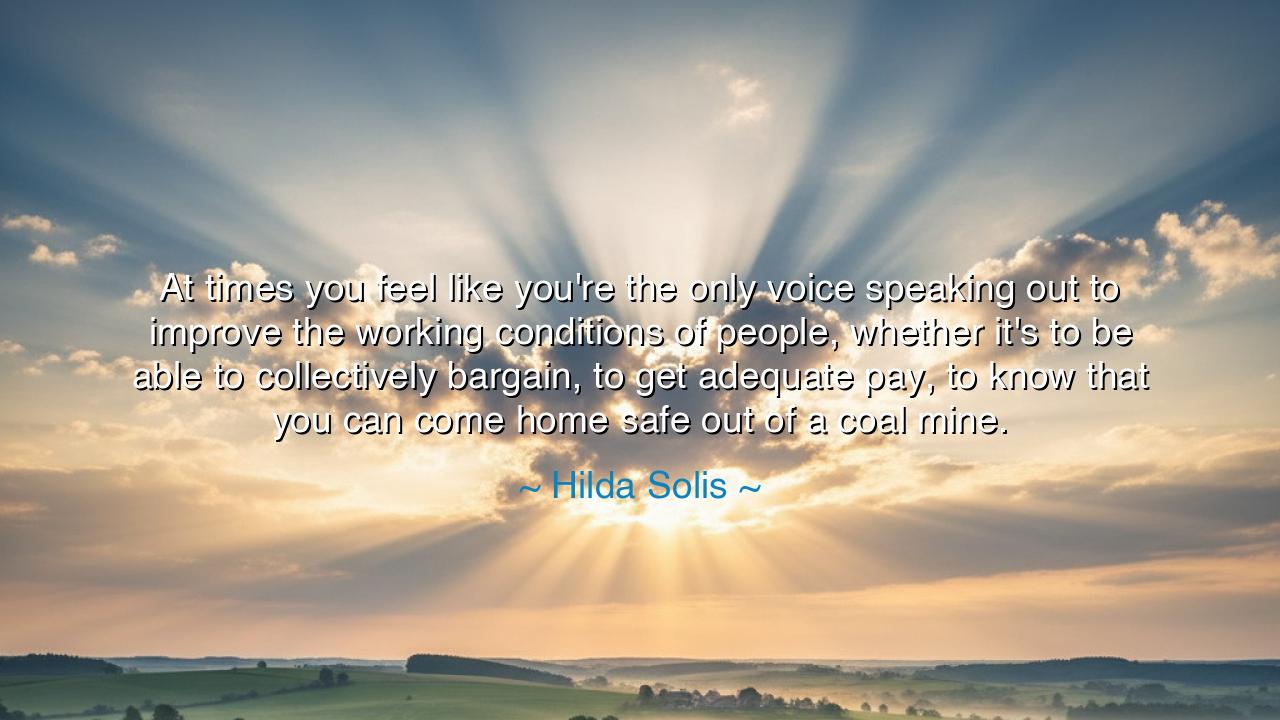
At times you feel like you're the only voice speaking out to
At times you feel like you're the only voice speaking out to improve the working conditions of people, whether it's to be able to collectively bargain, to get adequate pay, to know that you can come home safe out of a coal mine.






In the steadfast witness of Hilda Solis—“At times you feel like you’re the only voice speaking out to improve the working conditions of people, whether it’s to be able to collectively bargain, to get adequate pay, to know that you can come home safe out of a coal mine”—we hear the iron bell of conscience rung in a noisy marketplace. The words acknowledge a loneliness familiar to those who keep watch at the city gates: when profit shouts, mercy must sing louder; when fear quiets the many, one clear voice must refuse to sleep. This is not the drama of a day, but the long labor of generations who insist that bread be earned without blood and that a shift end with footsteps returning, not sirens.
The ancients would have called such labor sacred. They knew that a people’s justice is measured not by feasts in palaces but by the safety of hands that lift the morning. To “speak out” for the right to collectively bargain is to restore a broken chorus—one worker is a reed in the wind; a union is an organ that can move a nation’s breath. To demand adequate pay is not to covet; it is to name what dignity costs. And to swear that every miner shall come home safe is to declare the first law of the polis: no wealth is worthy that buries its makers.
This saying’s origin is the long road of work and hazard. In shafts of the coal mine, gas waits without smell; timber groans; dust turns lungs to stone. In fields, heat threshes more than wheat; in factories, a moment’s inattention can make a lifetime of loss. The advocate’s solitude arises because danger is often invisible until it is undeniable. Thus the sentinel must see before others see, must warn before others wish to hear. Solis names the ache and the duty: keep calling across the din until the doors of safety and fairness are opened, and stay until they are kept open.
History answers with both wound and remedy. Remember the Ludlow Massacre of 1914, when miners striking in Colorado for a living wage and decent shelter were met with bullets and flame. The dead included children whose only weapon was the hope of a safer tent. The nation recoiled; over years, reforms followed—eight-hour days, child labor laws, the slow legalization of collective bargaining. Or recall the Triangle Shirtwaist fire of 1911: locked doors, trapped seamstresses, smoke turning to verdict. From their ash rose fire codes, sprinklers, inspections—the scaffolding of today’s working conditions. Each catastrophe taught the same lesson: silence is expensive; speaking out is cheaper than funerals.
Yet there are mercies born of courage, too. After the Upper Big Branch disaster in 2010, voices—widows, inspectors, secretaries of labor—pressed for stronger rules, for real teeth in enforcement. Technical terms—rock dusting, methane monitoring—became instruments of compassion; numbers on clipboards turned into fathers at dinner tables again. In these victories, the lonely advocate finds company: grief recruits allies; truth finds a choir. What begins as one voice becomes a many-voiced vow: never again, not here, not to ours.
Take from this a clear teaching: justice advances on two feet—policy and persistence. Let your care be practical, not only poetic. Practical steps: (1) Join or form a workplace committee; where law permits, organize to collectively bargain so that safety and adequate pay are written, not wished. (2) Learn the hazards of your trade the way a sailor studies charts; insist on training, protective gear, and the right to halt unsafe work. (3) Keep record—incidents, near-misses, hours denied—and convert witness into action at hearings and inspections. (4) Build alliances—nurses with miners, teachers with drivers—so that an injury to one truly echoes in all. (5) Vote with your feet and your ballot for leaders who strengthen inspections and prosecute neglect that costs lives.
Finally, carry Solis’s sentence like a lantern in storm-dark: if you feel alone, you may simply be early. The first herald always sounds solitary before the city wakes. Keep speaking out. Tie your courage to the names of those who must come home safe; wrap your hope around the bread they deserve. And when at last the shift ends and the lamps of the coal mine wink out without disaster, you will know that the lonely watch was not in vain—for the gate stands, the road is lit, and the people cross it alive.






AAdministratorAdministrator
Welcome, honored guests. Please leave a comment, we will respond soon